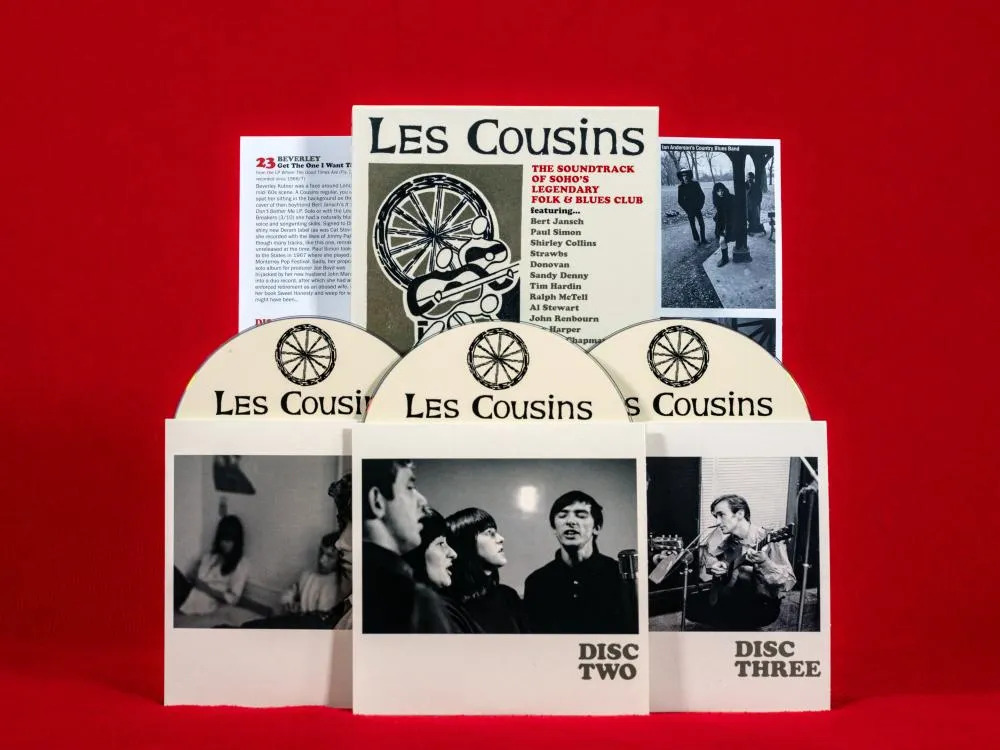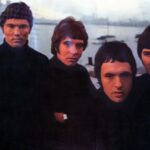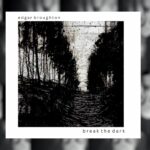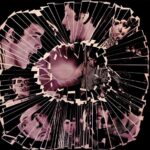
Les Cousins: The Soundtrack of Soho’s Legendary Folk & Blues Club (Cherry Red CRJAM3BOX21)
Close your eyes while lughole opening, it could be twice-weekly late-night radio with the heavier duvet-covering bits mislaid elsewhere in the ether. A venue that fed the folk and blues booms of the 1960s was at 49 Greek Street in London’s bohemian Soho, just around the corner from the Marquee and Covent Garden’s Bunjies across Cambridge Circus. Opening first as the Skiffle Club in 1956, it was expanded by Fulham café-owners Margaret and Loukas Matheou to serve French cuisine (Soho Grill), the locale renowned for French poets and anarchists since the 1790s, then Greek food as Dionysus in ’67.
First a disco referencing Claude Chabrol’s film Les Cousins (a contemporary same-name club in Brussels also existed, now plagiarized by a website in these contrasting times), the dank cellar was refitted and opened as a nightly folk and blues club on Sunday October 4th 1964. Without an alcohol license, a young crowd paid five shillings (25p) to waft among thick smoke and thinner sarnies with their coffee. More contemporary than traditional folk featured—booked performers were called from the Pillars of Hercules pub opposite, so Bowie was turned away—fuelling London’s Greenwich Village at the time of Bert Jansch’s acclaimed mid-1965 debut on the well-represented Transatlantic (1961-1977) label, which sometimes taped musicians with an engineer in-situ.
Al Stewart (who’d been in Tony Blackburn’s beat combo, here has Manuscript from 1970 when nailing historical folk-rock epics) compered thrice-weekly all-nighters where sofas were the cheapest hotel in town, as a new buzz rose around a stage too small for drums or amplification. One of the first influencing residencies was Bert Jansch, fresh from Edinburgh’s boheme to share a West Hampstead flat with John Renbourn (also tenants were the extravagantly dressed, energetic harmony trio The Young Tradition, here with The Banks Of Claudy). Jansch opens the box with the appropriate Running From Home, then duels guitars with John Renbourn on the following year’s impressionistic Soho. The Londoner also duets with the black American Dorris Henderson a few weeks before his solo LP (she married one of the Levee Breakers, here with a Parlophone single), meeting her at another Soho club called the Roundhouse says his website. He also features with Jacqui McShee before they formed the famous Pentangle when she ran the Red Lion club in Sutton, where allegedly the Rolling Stones met. Of mixed descent, Gerry Lockran’s Black Girl reworks a Lead Belly song, with Pentangle’s Danny Thompson on bass; he co-founded another club at the still extant Half Moon pub in riverside Putney, not far from another key venue the Troubadour in Earls Court from 1966. But unlike such famed contemporary clubs as those or the Marquee, Cousins had a camaraderie.
Truants from Greenwich Village include Paul Simon, from his CBS 1965 debut, and a trio of Elektra singer-songwriters: the influential on such as Dylan yet neglected Spider John Koerner, a 7 or 8 string guitarist for boisterous shows, and the chunky chords of Tom Rush (Joshua Gone Barbados). Jackson C. Frank has Al Stewart backing with Paul Simon producing, Dave Van Ronk’s ragtime-influenced ’64 debut, Julie Felix on sabbatical from her many television appearances playing covers, and the Woodstock Festival attendee Tim Hardin who died from heroin before he was forty (If I Were A Carpenter). This triple box offers traditional and modern fare seasoned with cross overs. Around the former camp’s crackling fire are Shirley Collins (with Davy Graham on the much-covered Nottamun Town; his Maajun (A Taste Of Tangier) highlights his fusion style from a groundbreaking Decca LP of ’65), the legendary Watersons (a Topic album’s Holmfirth Anthem), Anne Briggs (also on Topic, she taught Jansch the song Blackwaterside that was pirated by Page; Denny and Richard Thompson praised her, June Tabor says she was a first influence), Hamish Imlach, and a pioneer of mock traditional songs A. L. (Bert) Lloyd, here with Swarbrick for a song Jansch made famous, Jack Orion.
From a bevy of pre-fame teeth cutters emerge not only the Incredible String Band (or Incredible String Vest as Peel preferred) but their co-founder Clive Palmer’s C.O.B., with the period patchouli of Music Of The Ages from a Ralph McTell-produced debut. Actually Ralph May, Wizz Jones suggested renaming after the bluesman Blind Willie McTell, appears from a Transatlantic second LP that had his famous Streets Of London. Cat Stevens’ The Tramp plus Portobello Road reprise his ’60s Deram debut when he lived a few doors away with his Cypriot family; changing his name more often than an unsuccessful band, in Cousins’ days he was Steve Adams. John Martyn (i.e. Ian McGeachy from a North Surrey suburb up the road from Sandy Denny’s birthplace) sees his pre-experimental Island debut, whereas Roy Harper is from a small label before Harvest and befriending their famous brethren. Like Martyn and Stewart, he chose the mushrooming college circuit to build an enduring fan base. His ’69 live LP was recorded at Cousins, unmentioned in the booklet. Less remembered is scouser Steve Tilston (also on Village Thing, with backing group), whose first LP was album of the year in the Daily Mail and Rod Stewart buying a box for friends.
Acclaimed female singers include Sandy Denny from a small-label 1967 debut before fame with Strawbs (here from ’69) and Fairport Convention before her early death: You Never Wanted Me is by boyfriend Jackson C. Frank. Jo Ann Kelly, said to have been invited to join Canned Heat and Johnny Winter, sings Moon Going Down from a CBS album when the touring Mississippi Fred McDowell liked to call her up on stage to duet. She also died too young in 1990. Beverley Kutner, first seen on boyfriend Bert Jansch’s It Don’t Bother Me, has a recording c.1966 with Jimmy Page but unreleased until 2018. She also sings on the Levee Breakers’ single, not long after accompanying Paul Simon to America to guest at the Monterrey Pop Festival. After marrying John Martyn, her solo album for Joe Boyd became his and she semi-retired (the booklet’s anti-John slant is one-sided in popular lynch mode). Also the highly-rated Shelagh McDonald, who fled in 1972 before re-emerging a decade ago, Shirley Collins (a field-researcher of folk heritage in the 1950s), Anne Briggs, Maddy Prior with Tim Hart from Mick Softley’s St. Albans club before fame with Steeleye Span featuring Martin Carthy (Byker Hill from ’67 with Dave Swarbrick). Bridget St. John was Dandelion’s first signing for three LPS before emigrating; Ron Geesin is on guitar, who’s also here.
Michael Chapman’s No Song To Sing from Rainmaker is on Harvest, as is that seminal label’s same-year Third Ear Band (Alchemy) when staple counterculture diet gigging in Hyde Park with Pink Floyd, along with Kevin Ayers (Eleanor’s Cake Which Ate Her) nodding to his Soft Machine roots for this ’69 solo debut. Another innovator is Mike Cooper whose Pye discs are period classics. The then-unknown Nick Drake’s Northern Sky recalls bedsit skylights, next door to Sallyangie’s Mike and Sally Oldfield years before his Tubular Bells added to Virgin’s stash.
Hit makers include Donovan (Sunny Goodge Street) but his inclusion from the St. Albans period highlights an omission that shouldn’t really be, that of Mick Softley, a couple of whose songs were taken without permission by the starman. (Similarly, Hamish Imlach and Alex Campbell but no firebrand Ewan MacColl, no Gordon Giltrap, Michael-Claire, Marc Brierley or Mike Hart who is in CR’s roster, but completism is unattainable of course. Hart was on a Cousins compilation in 1970). Another charter was Alexis Korner (from a Liberty ’68 LP) who also is on Long John Baldry’s Gee Baby Ain’t I Good To You (1964), and the surprising top ten hits of theatre-queue busking one-man band Don Partridge (Rosie). Did he have a premonition that the future wouldn’t be able to distinguish between collaborate (which is negative, as with the enemy) and co-operate with other musicians in a band, just as viral is the (negative) adjective of virus?
If ever there was a name left behind by big labels’ largesse it was Wizz Jones, here on Ian A. Anderson’s Village Thing label of Bristol. That globetrotting busker was a kind of Beatnik guru in most scenes, as several big names cite and cover him (e.g. Bruce Springsteen). Maybe Keith Christmas or Duffy Power were left on a side plate too. Christmas was in Bristol’s Troubadour when at university and went on to be on Bowie’s Space Oddity and tour support the Who. His B&C title track Fable Of The Wings was covered by Carthy. Power (i.e. Ray Howard) was a leading blues/R&B singer from the 50s mentored by Korner though suffered life-long mental issues. His track is on the same (Firepoint) compilation as Hawaiian-influenced Sam Mitchell’s Leaf Without A Tree, who’s on Rod Stewart’s early LPs.
Rarer dishes on the menu are Al Jones (one album on Parlophone), the ragtime master John James who worked with Renbourn, and Derrol Adams from Skiffle Club days; his anti-war Portland Song (not here) was a staple in his native America; moving to Belgium he served European folk like Northerner Tom Yates who recorded for CBS and President when befriending Paul Simon and Duncan Brown before emigrating to Antwerp until his death in 1993. Village Thing label-mate Dave Evans (Grey Lady Morning) sang worldwide sailor yarns accompanied by a ringing self-made guitar with unusual tunings. Owen Hand was an ex-miner and soldier from Edinburgh who recorded a second album for Transatlantic at 32; his debut showcased Tom Paxton’s songs. Like Dave Ellis on a well-reviewed Sonet LP, Andy Fernbach had high hopes with Liberty but it was his only LP and he retired to build a studio. Nadia Cattouse was from Belize, her father a deputy Prime Minister, and though her third disc was on RCA (Earth Mother), produced by Sandy Robertson with songs by Dylan, Andy Roberts and Sydney Carter (composer of Lord Of The Dance) she turned to acting (Dixon Of Dock Green etc.).
Despite restrictive legroom, some bands were around the table such as leading Irish neo-folkers Sweeney’s Men (Reynard The Fox) embryo for Planxty and Pogues, the erudite whimsy of Dr. Strangely Strange’s Island classic, neglected Dando Shaft’s debut on Neon as if sent to Coventry where they formed—always closer to Trees than Pentangle—who first played the club in March ’70, and the swinging collectibles Piccadilly Line, a duo who were Al Stewart’s backing band. Welcome is Ian A. Anderson’s Country Blues Band on Liberty, indefatigable in Bristol to start Village Thing Records (his essay opens the booklet). Venue boot-legs have surfaced over the years (e.g. of Dr. Strangely Strange) but none are used here; a brief YouTube video shows another absentee, Nick Pickett who played in blues bands before a truly brilliant solo album.
On the third CD are the incongruous trio Mudge & Clutterbuck (a Saydisc EP) from the west and nearly signed by Joe Boyd, the male-female traditional duo Dave & Toni Arthur from a ’67 Leader-produced debut (Toni became a presenter of children’s T.V. like Play School), and the McPeake Family (Topic, 1963), a clan who penned classics in Irish repertoire as far back as the 1940s to pack the Albert Hall. More known to folk/country rock fans are Plainsong (Old Man At The Mill, 1972). Formed by Iain Matthews, who struck gold with Southern Comfort’s cover of Joni Mitchell’s Woodstock following the musical chairs of Fairport Convention, and Andy Roberts, a stalwart of the Liverpool Scene and working unsung on most Beatles albums alongside an army of extras. Low sales of Plainsong’s debut led to an unreleased follow-up until a recent Cherry Red box set.
After the Matheou family lost everything in Cyprus due to the Turkish invasion —opening food shops in Barking—in April 1972 the club finally locked its doors. Nay sayers might artlessly cavil about a flimsy umbrella for another compilation, but it’s not a banner rather a vehicle for a music trip through bygone rooms and corridors mingled with blooms as if whispering together about a magical micro culture. This legacy is a tribute to fruit from humble origins. Illustrated with photos and period diary pages, the original microphone in its velvet box on the booklet cover is a nice touch, as if symbolizing time’s path or route before and after.
BRIAN R. BANKS
Further information
Les Cousins: The Soundtrack Of Soho’s Legendary Folk & Blues Club, Various Artists 3CD Box Set



